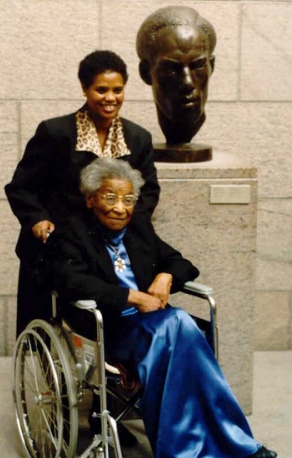
1903 - 2001
August 31, 2001 Halifax Herald
Dr. Carrie M. Best: genuine hero I first met Dr. Carrie Best about twelve years ago at the World Trade and Convention Centre during an educator's symposium. After listening to her speak, it became apparent to me that she was a true warrior in the ongoing struggle to defeat racism and other forms of intolerance. Her message came strait from the heart.
Our formal introduction took place after I had delivered a key-note address to the assembly about the four centuries of racist persecution that the Mi'kmaq had had to endure under both British colonial and Canadian governments. When I had finished speaking, she - radiating a warm, encouraging smile - came forward to congratulate me for having the courage to speak out. And based on personal experiences, she warned that continuing with the effort would not be easy because I'd be roundly criticized and ostracized by many white supremacists members of the establishment for it. It was a prophecy that has proven to be on the mark.
Carrie reinforced her words of caution by citing a few examples of the hateful personal attacks that these types had made against her because of her anti-discrimination work. She also, among many other related incidents, recounted the time in the 1950s when the late Racheal Marshall, a Mi'kmaq leader from Millbrook Reserve, was refused a room at the Nova Scotian Hotel during a racism conference because she was an Indian. This event confirmed for Carrie the true extent of the racism that the Mi'kmaq were being forced to contend with in this province at the time.
Although this encounter was our first face-to-face meeting, Dr. Best's work wasn't totally unfamiliar to me because I had acquired some knowledge about her past achievements from newspaper items and other sources. It was easy to gather from these that in the face of adversity, her courage was held in awe by many. In fact, when one takes into account that she had begun to speak out for racial justice in the 1920s, a time when people of colour were often barred from entering Nova Scotian business establishments, professions, etc., the courage she displayed was outstanding. It graduates to the remarkable when one brings into the equation the fact that it was also a time when Mi'kmaqs and African Nova Scotians could wind up in jail for disturbing the peace, without being accorded much of the niceties of justice, for being foolhardy enough not to be submissive to the white majority's will.
The main regret I have today about my acquaintance with Carrie, although we met casually several times afterwards and exchanged a few letters and phone calls, is that I didn't take time to visit with her in New Glasgow to get to know her better. The only excuse I can offer, and one she would probably accept, is that I was too involved with the same cause that she had so generously dedicated most of her life to -- seeking justice for the racially excluded.
That she had a total commitment towards finding racial equality for all the excluded is unquestionable. It was this trait that so impressed me. Like Martin Luther King and other great equality advocates, she was wise enough to know that racism is an inherent evil that can only be controlled through an all-inclusive effort. Because of this, I think that Dr. Carrie would have slightly resented the wording of the Herald headline that reported her passing on July 25: "Journalist fought for black Nova Scotians." If, instead, it had read, "Journalist fought for justice for the disadvantaged," she would have been delighted.
Since her death, in line with the lifetime hopes she had for inclusive action, a plea has been made by South African parliamentarian Pallo Jordon for Africans to form an alliance with First Nations Peoples to battle racism. The gist of it was reported by Chad Lucas in the Friday, August 10, issue of this paper: "Racism will fall faster when African-descended people tackle it together with other groups - like Canada's First Nations." That's the message a South African member of Parliament brought to a symposium on racism at Dalhousie University on Thursday.Ē " Mr. Jordan, an African National Congress member, was quoted as saying: ďIf we are to succeed in our struggles, we must build unity.... Itís of great significance for African-Canadians to build alliances with aboriginals.... They're as much the victims of racism as African people." Carrie must be smiling!
Mr. Lucas further reports: "A Mi'kmaq woman took part in the racism symposium's opening ceremonies, and several speakers have paid homage to Canada's original people. But few aboriginals have attended the conference." I can't speak for other members of the Mi'kmaq community, but I can state unequivocally that if an invitation had been extended, I would have been happy to accept and participate. Letís hope that the next time around, in keeping with the desires of great advocates such as Carrie, efforts will be made to make future symposiums more inclusive.
Dr. Carrie Best was an honourable, courageous and warm hearted person. She fought hard and long to try to see realized the racial harmony ideals she believed in. By so doing, she made a hugh difference and helped to reshape society for the better. For this superb achievement, she sets high among this country's genuine heros. Few have done so much in the face of so much adversity. I can only picture that Carrie will rest in peace in the Land of Souls, with the love of the Great Spirit embracing her for eternity ,for the love and generosity she gave so freely to the community during her ninety seven years on Mother Earth!
Daniel N. Paul
DANIEL N. PAUL